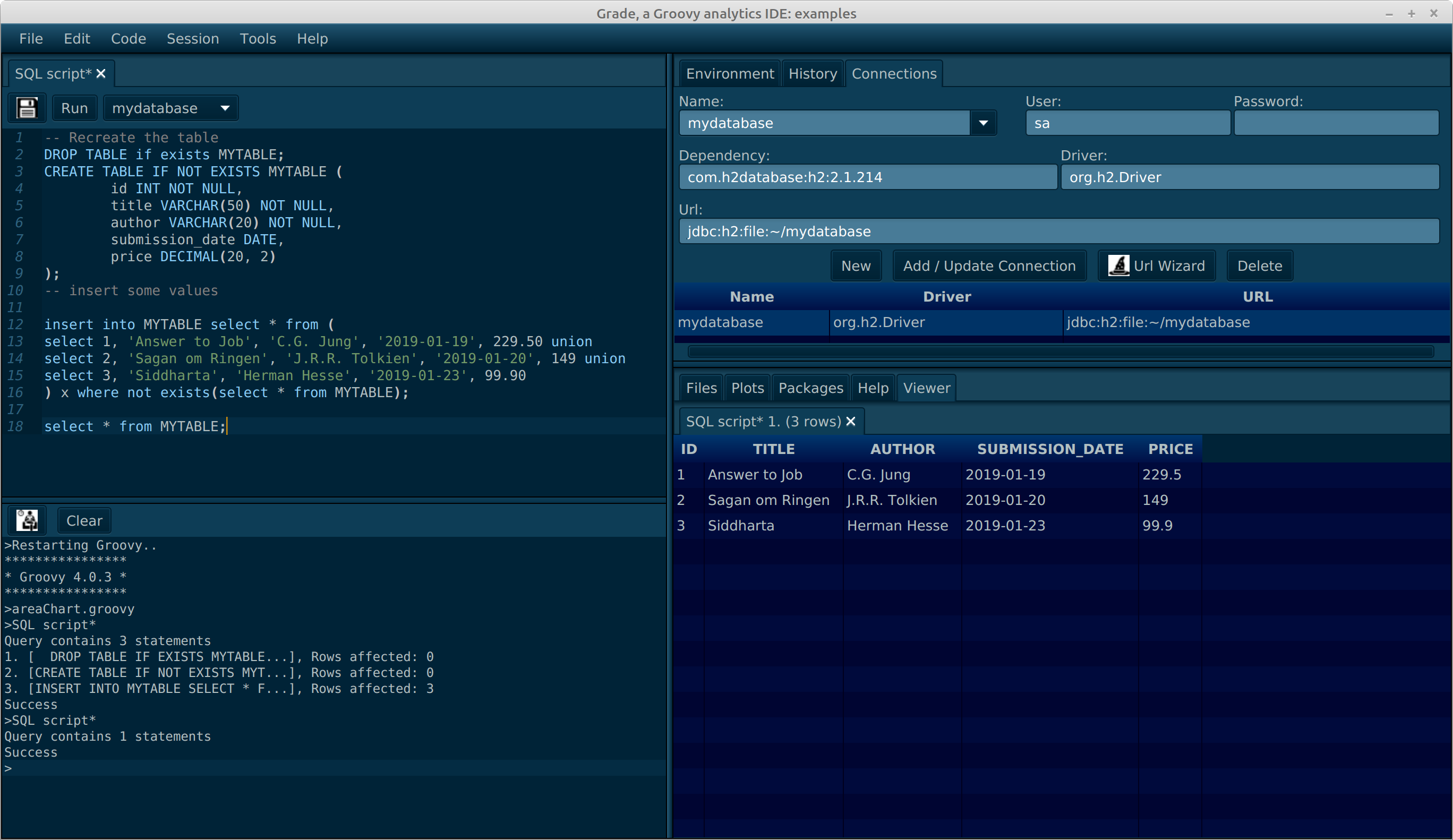Gade started off as a fork of Ride, but I wanted a simpler, more integrated set-up for Groovy based Data Science work. Since there is no equivalent to a data.frame OOTB in Java or Groovy, I created the matrix library for that. However, I also decided to fully support the Tablesaw library to provide a very mature data management library. To make Tablesaw slightly Groovier, I created a subclass of the Tablesaw Table class called Gtable (available outside of Gade in the matrix-tablesaw library).
The purpose of this IDE is to provide a groovy development environment for data analysis, visualization, model building, and machine learning. It runs Groovy code in the Groovy ScriptEngine thus allowing you to be conveniently used for ad-hoc work as well as for creating packages that can easily be integrated into a larger JVM based context (e.g Spring Boot, Grails, Play etc.).
It is fully functional i.e. it is possible to create, open, save and execute Groovy scripts, run selected text, ctrl + enter execution of current line or selected text, see variables created, syntax highlighting for XML, SQL, Java, Groovy, Javascript etc. It also has wizards to create Groovy applications or Libraries and of course, integrated support for git and gradle making it a very convenient development environment for analytics and data science.
Go to the releases tab and expand the assets section at the bottom of the release. Unzip the zip file gade-platform-version.zip e.g. gade-linux-1.0.0.zip into a directory of choice.
There are icons for windows and Linux in the base folder of the unpacked zip that can be used to create a desktop shortcut/launcher.
Use gade.cmd or gade.sh to start Gade.
If you want to run the bash script from windows git bash (msys), create a shortcut with the command
D:\whatever\Git\bin\bash.exe ./gade.sh
Where D:\whatever is the path to your git for windows installation
Also set the working dir in the shortcut to wherever you installed Gade.
If you want to override or customize startup options you can create a file called env.sh (or env.cmd) in the base directory where you installed (unzipped) Gade, e.g:
#!/usr/bin/env bash
# Add some additional memory
# Scale the application 200% as we have a Hi-DPI screen, see https://wiki.archlinux.org/index.php/HiDPI#Java_applications
# use the Marlin java2d rendering engine
JAVA_OPTS="-Xmx16G -Dglass.gtk.uiScale=200% -Dsun.java2d.renderer=sun.java2d.marlin.MarlinRenderingEngine"JAVA_OPTS is a special variable to add system properties (-D values) to java starting up.
Equivalent in windows is (note the placement of quotation marks):
set "JAVA_OPTS=-Xmx16G -Dglass.gtk.uiScale=200% -Dsun.java2d.renderer=sun.java2d.marlin.MarlinRenderingEngine"On Windows, you can also run Gade in java instead of javaw (so you can see the console) by setting the JAVA_CMD variable in the env.cmd i.e:
SET JAVA_CMD=javaShowing the result of a select query in the viewer tab and the connection view that is shown when you right-click a connection and choose "view connection".
For any issues or feature request etc. on Gade please use the github issue feature
- Cookbook - an introduction to use Gade to solve common Data Scientist tasks.
- Freecharts - A short description on how to use the Freecharts library with Gade
- User Manual - can be found in Gade (Help -> User Manual)
- Wiki - Wiki pages on various topics related to Gade
In the examples dir you can find a lot of examples of using Gade. Many of them are taken from Paul Kings groovy-data-science project at Github and modified slightly to work interactively in Gade.
To build Gade, simply do gradle build
A quick development run is simply gradle run
To create multi-platform distributions do gradle clean build runtimeZip
You will find the zip distros (gradle-*.zip) in the build dir, and the source jar and javadoc jar in build/libs
The install.sh script is an example of how to automate installation of the platform specific build on your machine.
Note: only direct dependencies are listed below.
Makes it possible to run Groovy scripts. Apache Software License, Version 2.0.
tools for working with tables and columns with the ability to create statistical models and visualizations. Apache License, Version 2.0
Very fast class and module loader scanning library. Used for autocompletion among other things. MIT License
Base for all code editors. Used to color (syntax highlight) code etc. Copyright (c) 2013-2017, Tomas Mikula and contributors under BSD 2-Clause "Simplified" License
Allows conversion of svg files to javafx Image nodes. MIT license.
The logging framework used. Apache 2.0 license
Used for JSON handling in various places. Copyright Fasterxml under Apache 2.0 license.
Used to detect file types as Files.probeContentType is inconsistent over different OS's; Apache 2.0 license.
Used to detect file encoding. Apache 2.0 license.
Used for time and string formatting Apache 2.0 license.
Used for reading files content Apache 2.0 license.
Used to validate and analyse SQL code. Apache Software License, Version 2.0.
Used to do semantic version comparisons. Apache Software License, Version 2.0.
Used to provide git support. Eclipse Distribution License v1.0
A data container library for Groovy, similar to Joinery and Tablesaw for Java. MIT license.
Makes it possible to load jdbc drivers without having to resort to the system classloader. MIT license.
Commonly used datasets in other data science languages (R, Python/Pandas) such as mtcars, Iris etc. MIT license.
Provides support for REST interaction with Munin. MIT license.
Provides support for processing Groovy Markdown (gmd). MIT license.
A chart library for Groovy. Provides integration with Javafx Chart, Tablesaw Plotly charts, and (work in progress) a grammar of graphics implementation for Grooy similar to ggplo2. MIT license.
If you are interested in helping out, reporting issues, creating tests or implementing new features are all warmly welcome. See also todo for roadmap.

